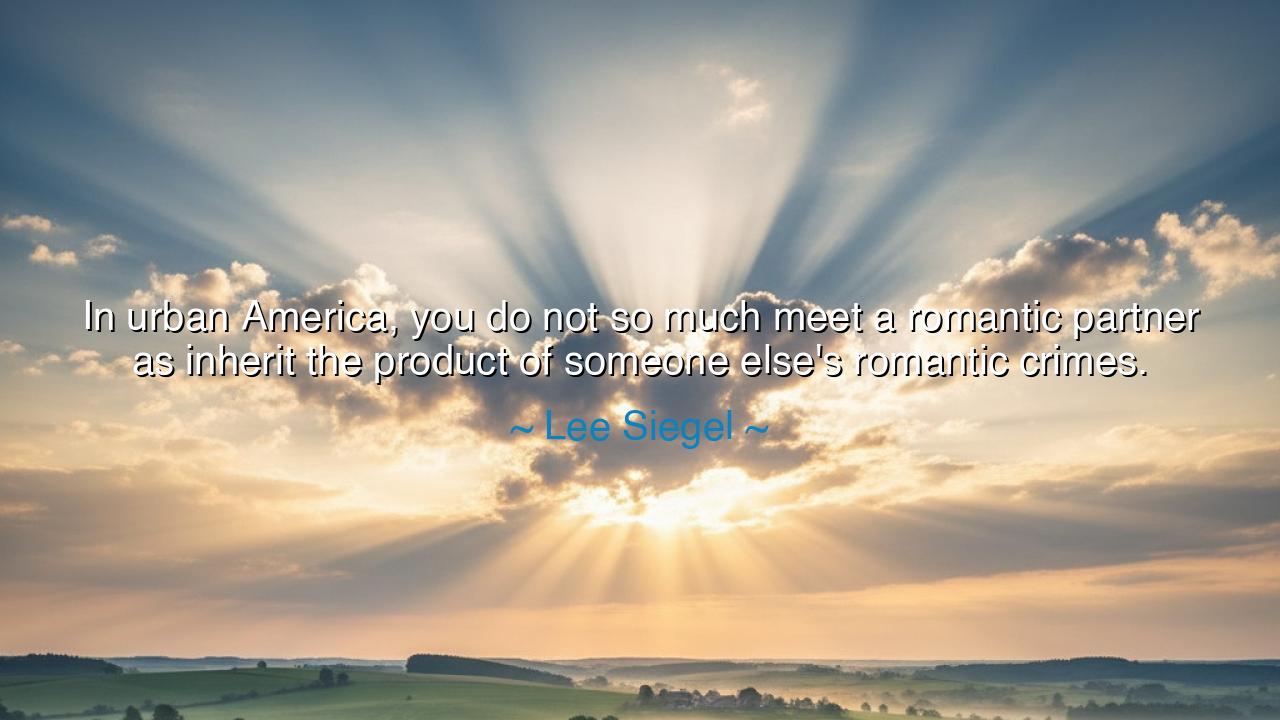
In urban America, you do not so much meet a romantic partner as
In urban America, you do not so much meet a romantic partner as inherit the product of someone else's romantic crimes.






O Seekers of Wisdom, listen closely to the words of Lee Siegel, who speaks of the complexities of romance in the modern world: "In urban America, you do not so much meet a romantic partner as inherit the product of someone else's romantic crimes." In this stark observation, Siegel reflects on the way modern relationships are shaped by the baggage of past experiences, where the echoes of previous lovers, mistakes, and heartaches shape the dynamics of new encounters. It is a profound commentary on the nature of romantic entanglements in today’s world, where individuals are not simply meeting one another with fresh hearts, but are instead inheriting the scars and consequences of past emotional battles.
In the ancient world, the idea of inheritance—be it land, wealth, or even legacy—was a central theme of philosophy and life. The Greeks and Romans understood that every generation carries the weight of the past, whether in virtue or vice. Plato spoke of the way that society and the individual are deeply intertwined, where the actions of one person or one generation shape the reality of those who follow. In his work, The Republic, he noted that society must continually strive to create a just and virtuous foundation, for the moral choices of one generation ripple into the next. In Siegel’s words, the romantic choices of one generation inevitably shape the love lives of those that follow, creating a web of emotional consequences that are not easily untangled.
Consider the story of Paris and Helen in ancient Greek myth. Their love, while romanticized as the beginning of the Trojan War, was also a cautionary tale of how the actions of one person’s desires can bring about monumental consequences for others. Helen’s elopement with Paris, a product of personal longing and betrayal, led to the suffering of countless others. The wars, the losses, the emotional scars of an entire generation were the result of their personal choices. Similarly, Siegel’s observation suggests that in today’s world, we are often bound to inherit the consequences of previous relationships, where our own romantic lives are shaped by the emotional battles fought by those who came before us.
This is the heart of Siegel’s reflection—inherited emotional baggage. In modern urban life, individuals often meet one another not as fresh, unmarked beings, but as carriers of the past. Emotional scars, from previous relationships, are passed along like an invisible inheritance. Just as family legacies shape our identities, so do the emotional experiences of former partners shape our romantic connections. Like Achilles, whose fate was sealed by the choices of others, so too are we bound by the decisions and mistakes of those who came before us, whether it is the rejection of a former lover, the unhealed wounds of a previous marriage, or the lingering resentments of unaddressed pain.
In our own time, the prevalence of modern dating—through apps, quick encounters, and fragmented connections—has only heightened this phenomenon. Emotional baggage is not easily left behind; it follows us, sometimes unknowingly, into new relationships. Trust, communication, and the wounds we carry often shape the stories we bring into new love. Just as Rome was built upon layers of history, so too are our romantic lives built upon the history of those we encounter. The residue of previous emotional crimes—unfaithfulness, hurt, betrayal—can linger in ways that affect us, often unconsciously, influencing how we approach love and intimacy.
The lesson, O Seekers, is to recognize that the legacy of past relationships is not only a burden but also an opportunity for healing. Just as the ancients understood that the cycles of life must be acknowledged and transcended, we too must learn to see our relationships as part of a greater tapestry—a story that involves not only our own hearts but the hearts of those who came before us. Awareness of this inherited emotional baggage can give us the power to transform it, to recognize the patterns that bind us to past pain, and to choose a different path forward. We must take responsibility for our emotional inheritance, recognizing that the choices we make in love not only affect our present but shape the future as well.
Let us, then, act with mindfulness and intent in our romantic lives. When we enter into new relationships, let us be aware that we are not only meeting a new partner but inheriting a legacy of emotional histories. Let us approach these connections with wisdom, and with the understanding that the work of healing, of understanding, and of letting go is often required to move forward. Just as the ancient philosophers urged their students to seek self-knowledge and wisdom, so too must we strive to understand the deep emotional layers within ourselves and our partners, and seek to create new legacies of love that are free from the burdens of the past. In this way, we can create a future that is unencumbered by the mistakes and misfortunes of others and filled with the hope and promise of new beginnings.






AAdministratorAdministrator
Welcome, honored guests. Please leave a comment, we will respond soon